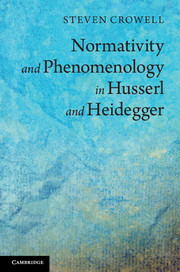Book contents
- Frontmatter
- Contents
- Acknowledgments
- Citation conventions for the works of Husserl and Heidegger
- Introduction
- Part I Transcendental philosophy, phenomenology, and normativity
- Part II Husserl on consciousness and intentionality
- Part III Heidegger, care, and reason
- Part IV Phenomenology and practical philosophy
- References
- Index
Introduction
Published online by Cambridge University Press: 05 April 2013
- Frontmatter
- Contents
- Acknowledgments
- Citation conventions for the works of Husserl and Heidegger
- Introduction
- Part I Transcendental philosophy, phenomenology, and normativity
- Part II Husserl on consciousness and intentionality
- Part III Heidegger, care, and reason
- Part IV Phenomenology and practical philosophy
- References
- Index
Summary
This book outlines and defends a new understanding of the philosophical importance of phenomenology, taking the work of Husserl and Heidegger as exemplary. The crux of this understanding lies in the connection between normativity and meaning, a connection that has been extensively explored in certain strands of analytic philosophy but has not been sufficiently appreciated in the phenomenological tradition. In one sense this is odd, since meaning (in the form of an analysis of intentionality) has been central to that tradition from the beginning. In another sense, however, it is perfectly understandable, since neither Husserl nor Heidegger (nor most of their followers) identified the theme of phenomenology specifically with meaning (Sinn). Rather, Husserl understood phenomenology to be a science of consciousness, while Heidegger understood it to be an approach to being. At the same time, both Husserl and Heidegger argued that phenomenology transformed the sense of previous philosophical concepts, so it is not altogether clear how we are to understand terms like “consciousness” and “being” in their writings. As I have argued in Husserl, Heidegger, and the Space of Meaning (2001), and continue to argue in this volume, a careful look at the particular descriptions, analyses, and interpretations offered by each shows that it is phenomenology’s focus on the transcendental conditions of the constitution or disclosure of meaning that upsets our understanding of traditional philosophical topics in the ways that exercised Husserl and Heidegger. It thereby also allows us to appreciate why the analytic treatments alone are not enough.
The closer examination of the space of meaning in its character as a norm-governed phenomenon, and of the self or subject capable of experiencing such meaning, is the primary aim of this book. That examination yields a conception of phenomenology that sees in it neither a one-off product of a largely defunct continental metaphysical tradition, nor an appendage that deals with marginal cases of “what it is like” to experience something. The phenomenology I have in view offers a deep and compelling approach to problems of philosophy. In this volume, issues in philosophy of mind, moral psychology, and philosophy of action provide the primary focus for illustrating this claim.
- Type
- Chapter
- Information
- Publisher: Cambridge University PressPrint publication year: 2013



